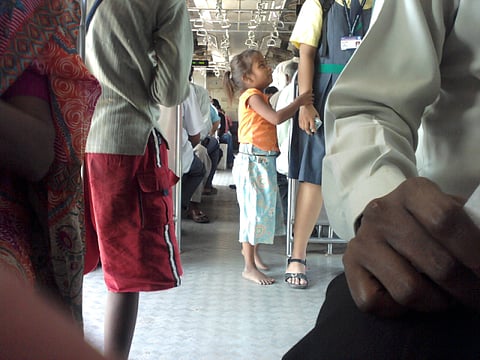

Rita, who works as a domestic help in houses and hotels in Bengaluru, returned home on the evening of August 6 only to find her two daughters Sanjana and Chaitrika had not come back from the park.
The mother of four, who struggles to make ends meet to pay a monthly house rent of Rs 2,000, rushed to the Child Welfare Committee where she was reportedly informed that both had been picked up under "Operation Smile", an initiative carried out by the city police in association with other departments of the government and NGOs.
A month after the Operation conducted across the city 'rescued' 250 children in an attempt to crack down on suspected trafficking racket and curb begging, two NGO's on Saturday released an interim report calling the operation a "misguided one".
The NGOs say they looked into around 30 cases, with Rita's being one of them, and have found that only two of them were genuine cases of begging.
During their interaction with children and their families, they claim they observed that not only was the entire process of picking up children arbitrary, but many also had to undergo harassment to get their children released.
Mentioning that children were 'randomly' rescued, the report said,
"Rather than doing the detailed investigation, it seemed more likely that children were picked up based on a profile of what children to be picked up should look like. From what we were able to see, it boils down to coming from a particular income demographic, coupled with certain class markers. If the child appeared to be poor,if the parents employment was related to work on the street, or if the family was not conversant in English or Kanadda. Pick up often sounded like unprovoked ambushes."
Three girls hailing from a migrant family in Uttar Pradesh had stepped out to buy shampoo when they were "captured". "There was no endeavour to ascertain why the children were where they were, where their parents were and if the children were indeed into beggary. The sole criteria applied here seems to have been the appearance of the persons captured wherein they seemed to be poor. This was confirmed when the committee that subsequently released the three girls reprimanded the parents of the girls for letting them wear 'dirty clothes'," states the report.
"You are capturing 100 children in the hope of rehabilitating that one child who has been exploited. And you end up violating the rights of the rest 99," said members of the NGOs.
"Also, all the children have now been released. And how come no cases have been registered yet," asks Nishita Khajane of Concerned for working Children.
In their report they also said, "We fail to understand why the process of relief of children is so complicated. Would it not suffice that the child identifies a person as his/her mother/father?"
According to the NGOs, there are better ways to identify children who need to be rescued instead of basing such a project on assumptions- like the parents of the children are beggars or that they have been kidnapped.
Members of the NGOs told reporters that while they do not negate the existence of such rackets, authorities need to be more sensitive and rational in their approach.
Many of the parents, whose children who had been rescued and taken to state-run shelters, work as daily-wage labourers. They said were not informed when the rescue team picked up the children and later were not given clear directions on the process of getting their children released. "Migrant families faced the added distress of unfamiliarity. Parents were often not allowed to meet their children...Children complained of beatings inside the state homes, and most of them just wanted to be reunited with their parents," the report says.
Other questions which the report raises are what happens if an older child is in charge of taking care of a younger sibling since their parents might be out working. Or what about those who have been abandoned by families, or are living away from families and are looking after themselves.
Punching loopholes in the operation, Darshana from ALF said, “The fact that someone is poor is made criminal. This project was meant to help children, but it ended up hurting them. ‘Operation Smile’ is a failure because no one seems to be smiling at the end of it."
The next step the NGO plans is to file an RTI and submit the report to the government, including the stakeholders in the operation. The final report on Operation Smile is likely to be released in a month's time.
Speaking to The News Minute, P Harishekaran, Additional Commissioner of Police (East) had earlier said that of the 250 children rescues, 200 had been given back to their biological parents.
He however was unavailable for a comment on the NGOs report.